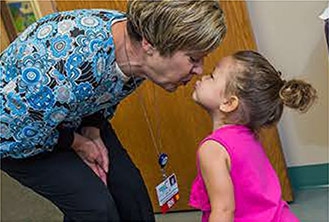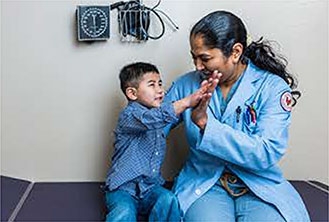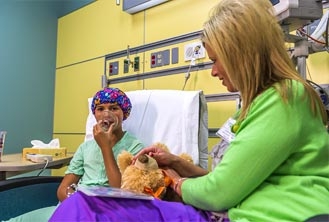Family Support Programs
 At the Congenital Heart Center, we don’t just offer treatment for our patients. We offer each patient’s family a variety of services and support to fulfill our Mission to provide the greatest care and love. You can rest assured families always have the support they need.
At the Congenital Heart Center, we don’t just offer treatment for our patients. We offer each patient’s family a variety of services and support to fulfill our Mission to provide the greatest care and love. You can rest assured families always have the support they need.
The Organization For Understanding Congenital Hearts (T.O.U.C.H.)
T.O.U.C.H. – The Organization for Understanding Congenital Hearts – provides emotional support for the parents, the child and the entire family. The group brings together parents who have common concerns, feelings and anxieties. They share information and encourage each other through a Parents’ Survival Kit, an annual fall picnic, and Heartline, which provides a one-on-one connection with another parent whose child has been part of our heart program at Children’s Hospital.
For more information, call 309.655.2650 or 800.443.9898 or visit their website at touchhearts.org.
T.O.U.C.H. Picnic at Donovan Park in Peoria
Sunday, June 4, 2023 | 12 - 3:30 p.m.
RSVP by May 29th
 Family House
Family House
Family House is a safe and convenient community resource that functions as a temporary home for families with loved ones in the hospital. It has all the amenities of a traditional hotel and also offers communal facilities for those who desire to share meals and give each other emotional support during stressful times.
Social Work Support
The Congenital Heart Center has a full-time social worker to provide professional assistance in seeking financial resources, psychosocial intervention and advance care planning.
 Child Life Services
Child Life Services
Our Child Life specialists are specifically trained to help children and their families better understand illness, hospitalization and outpatient procedures. Research shows that children who know what to expect cope better with the stress of hospitalization. Our specialists help decrease stress and anxiety related to procedures, separation from home and family and changes in routines.
We do this through a variety of activities, including preoperative tours, developmental play, procedure support, medical play (which allows children to interact with medical instruments) and special support for patients and siblings.
